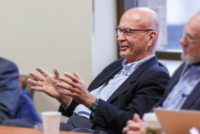NASSP Conference (North American Society for Social Philosophy)

In Canadian politics, values seem important. Justice and fairness are concerns that can wreck any political campaign that seems to ignore them. Not only do we have a museum of human rights (in Winnipeg), but we are sufficiently proud of Canadian diplomat John Humphrey’s role in drafting the Universal Declaration of Human Rights to place a statue commemorating this at a prominent location in Ottawa.
Wearing values for political colours is fashionable, and, frankly, I would rather live with this than with a politics of cynicism, ‘realism’, or patronage. But there is a worry: is it real, or is it show? To paraphrase Plato, are these political values mere images flashed in the political shadows, or are there some actually good ideas here that would bear inspection in the light of day?
Philosophers are not insensitive to these worries, and contemporary analytical philosophers began waking up to them in the 1970s, with some cutting examinations of social injustice, duties across borders, and environmental ethics. The ‘social philosophers’ among them have focused especially on what is right and wrong about our social relations and institutions.
The state of the art in this critical and analytical brand of social philosophy will be on display in Ottawa this July, as the North American Society for Social Philosophy holds its 33rd International Conference on Philosophy here at Carleton.
Power is the focus of this year’s conference. The conference theme, Power and Public Reason, presupposes that anyone who exercises power owes an explanation and justification to those over whom it is exercised.
[wide-image image=”19810″]
Power and Public Reason
Since when is power a topic of interest to philosophers? At least since 1784, actually, when Kant discussed ‘the public use of reasoning’ in his famous essay, ‘What is Enlightenment?’ While Kant urged rulers of his time to regard the public use of reasoning not as a threat to their power but rather as an aid to good governance, he did not go so far as to state publicly that rulers are in any way accountable to public reason. Now, 250 years later, social philosophers contend that the legitimacy of power and its exercise depend on public reason, which has become a central topic for such intellectual luminaries as John Rawls, Jürgen Habermas, and Amartya Sen.
One of the plenary addresses, by Prof. Noelle McAfee of Emory University, assesses gaps between public reason and the current state of public opinion on duties to assist refugees. In many (or perhaps all) countries, feelings of obligation to fellow citizens are stronger than feelings of commitment to outsiders, yet people’s need for protection is greatest when they cannot count on fellow citizens for protection.
In another plenary, Prof. Gerald Gaus (University of Arizona) raises a persistent theoretical problem. Given what Rawls acknowledged as ‘the fact of pluralism’, how can public reason forge agreement on important public issues when its premises are supplied by so many conflicting conceptions of what is right and good?
Parallel sessions will include upwards of 120 presentations on topics ranging from the theory and practice of public reason to specific issues concerning climate change, democratic deliberation, disability, First Nations, gender justice and feminism, hate speech and slurs, migrants and refugees, and racism.
Reading groups will be organized for interested faculty and students, and for interested members of the public (contact philosophy@carleton.ca). Conference support is being provided by the Social Science and Humanities Research Council of Canada as well as the Department of Philosophy and the Dean of Arts and Social Sciences at Carleton.
[wide-image image=”19812″]
The 33rd International Conference on Social Philosophy sponsored by the North American Society for Social Philosophy will be held at Carleton July 21-23, 2016. For more information, visit the North American Society for Social Philosophy’s website.
Jay Drydyk is a Professor of Philosophy at Carleton who has specialized in globalizing the concerns of social philosophy. His books include Displacement by Development: Ethics, Rights and Responsibilities (with Peter Penz and Pablo Bose), Human Rights: India and the West (with Ashwani Peetush), Theorizing Justice: New Insights and Future Directions (forthcoming, with Krushil Watene), and the Routledge Handbook of Development Ethics (forthcoming, with Lori Keleher).